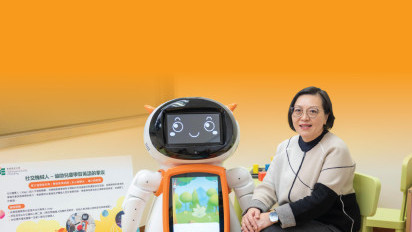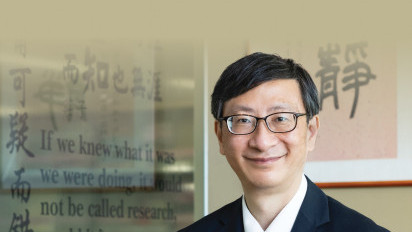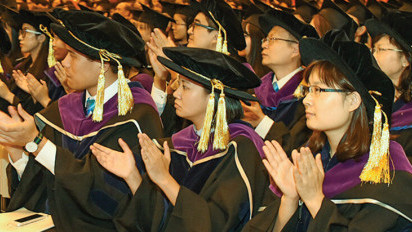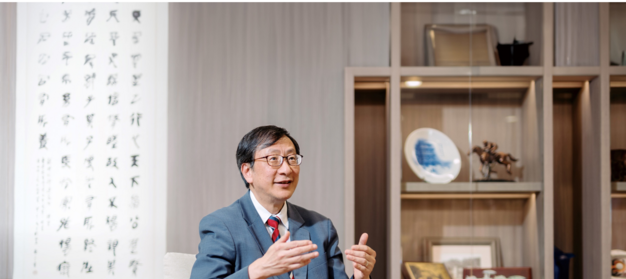Professor John Lee Chi-Kin, who took on the role of president in September 2023, explains how EdUHK can play an integral part in Hong Kong’s education future.
Turning a threat into an opportunity
With a mother who was a kindergarten teacher, Professor Lee is deeply rooted in education. “I realised very early on that my vocation in life would involve teaching and learning in some way. What I didn’t initially imagine, however, is how that vocation would become a lifelong aspiration to shape the future through education,” he says. After beginning his career as a secondary school teacher, he moved into the academic side of education, firstly as a lecturer at Sir Robert Black College of Education (one of the five colleges which amalgamated into EdUHK), before becoming Dean of Education at The Chinese University of Hong Kong. He joined EdUHK (then the Hong Kong Institute of Education) as Vice President (Academic) in 2010, then adding the role of Provost to his responsibilities in 2019.
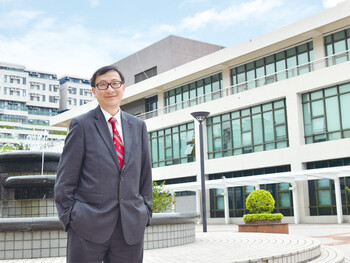
On the EdUHK campus in 2019
As President, Professor Lee is navigating EdUHK through shifts in education. “In Hong Kong, we are faced with a declining population. This can be seen as a threat to our future, but I prefer to see it as an opportunity,” he says. In his view, the situation gives the city the impetus to establish itself as a multicultural, multilingual education hub, similar to other major world cities. “If Hong Kong were to attract more people from outside of the city, the local community and economy could benefit greatly. This would further increase our highly skilled workforce and enhance innovation. Yet, achieving this requires emphasis on an inclusive and welcoming mindset,” Professor Lee explains. He sees initiatives such as the Greater Bay Area (GBA) and Belt and Road (B&R) as opportunities to open students’ minds, as they learn about other places, education systems, cultures and languages. Scholars, meanwhile can benefit from exchange, collaboration in and different perspectives towards research.

International education hub
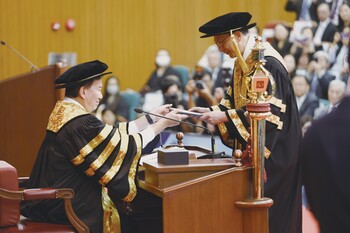
Installation ceremony of President Professor John Lee Chi-Kin, presided over by Council Chairman Dr David Wong Yau-ka
Education, after all, is the beating heart of the development of any society. Professionals from outside tend to come with their families, so are naturally attracted to a city with a high-quality education and socio-cultural system for their children. Not only that, Hong Kong also has the opportunity to attract researchers and students from around the world by creating an education hub. “EdUHK is well-placed to make a major contribution. We are well-known for our legacy in teacher education dating back to 1881, as well as our strong research profile in education,” says Professor Lee. In the last UGC Research Assessment Exercise, for instance, 63% of EdUHK’s education profile was judged to be “world leading” or “internationally excellent”, and all its educational research was assessed to have “outstanding” or “considerable impacts” in terms of reach and significance.
As part of its drive towards facilitating such a hub, the University has reached out to institutions and governments in the GBA, mainland China as well as B&R countries on subjects as diverse as virtues and values, culture, university teaching, technology and sport. For example, it recently enhanced collaboration with renowned universities, such as Sun Yat-Sen University, Tsinghua University and Nanjing University in mainland China. Also, following on from the success of similar projects in Vietnam and Cambodia, EdUHK has embarked on a discussion of a teacher capacity building project possibly with the government and a university in Brunei. “Hong Kong SAR is part of China, so EdUHK can be interpreted as a national university in a way. Yet, through the B&R initiative, as well as being in a global city, we are also able to forge many connections in education with the outside world,” explains Professor Lee.

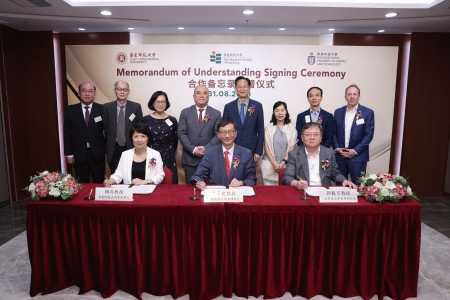
Signing of a Memorandum of Understanding with The Hong Kong University of Science and Technology and East China Normal University, establishing the Artificial Intelligence and Education Futures Alliance
President Professor John Lee Chi-Kin and Council Chairman Dr David Wong Yau-kar during the signing ceremony for EdUHK’s new academic building on its Tai Po campus
Interdisciplinary approach
Another positive effect of attracting more extramural academics, students and inviting institutional partnerships is the ability to advance knowledge. “To me, education means different things,” says Professor Lee. “It’s about building two-way communication between teacher and student, as well as innovation.” The last of these has become increasingly important in recent years, leading to EdUHK establishing two new academies – for Applied Policy Studies and Education Futures (AAPSEF) and Educational Development and Innovation (AEDI) – to bridge the gaps between faculties, allowing for a more flexible structure, and facilitate development of educational technologies (EdTech) and other new areas to research and continually improve pedagogical methods. “Modern innovation and technologies mean that traditional disciplines do not necessarily provide solutions,” says Professor Lee. The academies offer master’s programmes with input from external professors and other experts in fields such as legal education, policy studies, neuroscience, innovation and entrepreneurship. “These areas provide us with a new perspective in exploring different pathways and possibilities,” he adds. While some may not see these fields as directly linked to education, Professor Lee has a different opinion. “It’s about finding multiple ways for education application, so young people can develop 21st century skills to meet society’s needs,” he says.
EdUHK is well-placed to make a major contribution. We are well-known for our legacy in teacher education dating back to 1881, as well as our strong research profile in education.
Virtues and ethics
In the near future, powerful machines and AI-generated tools will be able to complete tasks which are time-consuming today, with great speed and ease. That said, there is a danger that we become too dependent on them, to the cost of human elements, including ethics and traditional virtues. “To avoid being controlled or manipulated by technologies, the younger generation will need to be strong in creativity and critical thinking, collaboration and ethical judgement,” Professor Lee explains. Courses are embedded with ethics, such as the 6-P pedagogical approach that guides students in self-regulated learning and behaviour when using artificial intelligence-enabled generative tools. National education is also a key component in achieving this aim. “National identity involves several distinct aspects, including being a national citizen and identifying with Chinese culture, traditions and virtues; instilling a pride in being part of China,” says Professor Lee. EdUHK has taken several steps to provide students with a solid grounding in this area. These include establishing centres for areas such as classical Chinese education, and national security and legal education research; jointly running a course for pre-service teachers on experiential learning with Qufu Normal University in the hometowns of Confucius and Mencius; and co-producing teaching materials, public lectures and workshops for teachers and schoolchildren to promote moral and affective values in traditional Chinese culture. These humanistic elements, combined with understanding of technologies, nurture a well-rounded approach in young people.
National identity involves several distinct aspects, including being a national citizen and identifying with Chinese culture, traditions and virtues; instilling a pride in being part of China.
Launch ceremony of the National Security and Legal Education Research Centre at EdUHK
Consequently, the University’s multidisciplinary, international approach can be of great significance for the future of Hong Kong. “As a leading institution in education, EdUHK cultivates future teachers, who go on to nurture schoolchildren. We have to be pioneers in education futures to benefit young people across the city, irrespective of their background, so that they are open-minded as well as ethically and intellectually prepared for tomorrow’s world,” says Professor Lee.
| Profile |
|---|
| Professor John Lee Chi-Kin, JP |
BA (Hons), The University of Hong Kong MSc, University of Oxford Diploma in Education (with distinction), MA (Education), and PhD, The Chinese University of Hong Kong |
| Current positions held (selected): |
The Education University of Hong Kong President Chair Professor of Curriculum and Instruction Director, Academy for Applied Policy Studies and Education Futures, Academy for Educational Development and Innovation, andCentre for Religious and Spirituality Education Member, 14th National Committee of the Chinese People’s Political Consultative Conference UNESCO Chair in Regional Education Development and Lifelong Learning (2019-2023; 2023-2027) Research Fellow, The Southeast Asian Ministers of Education Organization Chairman, Academic Committee of the Centre for Hong Kong and Macao Research of South China Normal University |
| Awards: |
Changjiang Scholar Chair Professor, conferred by the Ministry of Education of the People’s Republic of China President’s Award for Outstanding Performance in Knowledge Transfer (Team Award), EdUHK (2016/17 & 2021/22) The Vice-Chancellor’s Exemplary Teaching Award, CUHK (1999) Silver Medal & Bronze Medal (with other PIs) in the Geneva International Inventions Exhibition (2021 & 2023) |
| Advisor (current & past, selected): |
Honorary Advisor (Education), Sik Sik Yuen Honorary Advisor, Hong Kong Kindergarten Association and Hong Kong Federation of Education Workers Honorary Advisor, Hong Kong Professionals and Senior Executives Association Honorary Advisor, Hok Yau Club Advisor, Our Hong Kong Foundation Advisor, Character Education Foundation (CEF) and Hong Kong Association of Deputy Principals Academic Advisor, Association of Inspectors, Education Bureau (AIEDB) |
| Publications: |
Edited/written more than 25 books, 175 journal articles and book chapters Leading co-editor of book series: Curriculum and School Development in Asia and Education for Sustainability (Springer book series) The Routledge Series on Life and Values Education and The Routledge Series on Chinese Language Education |
For more details, please visit
https://www.eduhk.hk/en/experts/professor-lee-chi-kin-john


